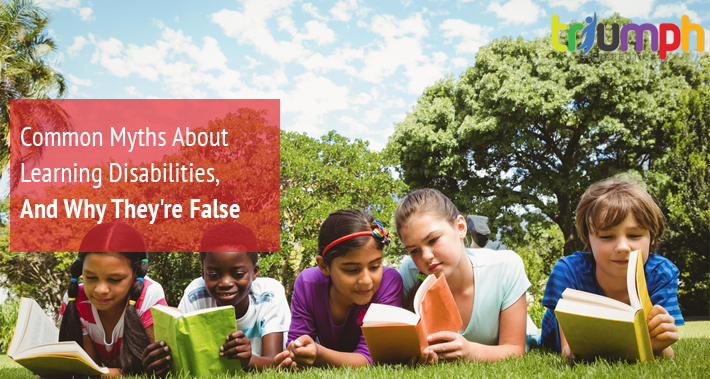Common Myths About Learning Disabilities, And Why They’re False
https://www.triumphtherapeutics.com/wp-content/uploads/2022/09/Triumph-Therapeutics-Speech-Therapy-OT-Physcial-Therapist-Washington-DC-Sep02-01-2022.jpg 710 379 Triumph Therapeutics Triumph Therapeutics https://www.triumphtherapeutics.com/wp-content/uploads/2022/09/Triumph-Therapeutics-Speech-Therapy-OT-Physcial-Therapist-Washington-DC-Sep02-01-2022.jpgThere are a lot of myths surrounding learning disabilities.
For instance, some people mistakenly believe that learning disabilities can be caused by low intelligence, parental neglect, or even too much television.
Unfortunately, these myths significantly contribute to stigma and ableism towards people living with learning disabilities.
If your child has been recently diagnosed with a learning disability, you might be struggling to find accurate information regarding your child’s diagnosis.
We’re Triumph Therapeutics, a pediatric therapy clinic in Washington DC and today we want to debunk some of the most common myths surrounding learning disabilities.
Let’s get started.
MYTH 1: Kids With Learning Disabilities Are less Intelligent On Average
The myth that learning disabilities result from low intelligence is an old one.
However, it’s just that: a myth.
Why It’s Wrong
Despite the prevalence of this myth, learning disabilities are actually only diagnosed in people with average or above average intelligence.
What’s The Truth?
Despite often having above average IQ, children with learning disabilities typically struggle to demonstrate their intelligence in neurotypical ways.
In other words, it’s not that children with learning disabilities can’t learn, it’s simply that they learn differently than their peers.
MYTH 2: Your Kid Doesn’t Have A Learning Disability, They’re Just Lazy
This myth is common amongst many invisible disabilities, such as ADHD, depression, and of course learning disabilities.
Why It’s Wrong
The reality is that children with learning disabilities often must try harder than their peers to accommodate for their symptoms.
Unfortunately, the myth that children with learning disabilities are lazy is just as harmful as it is false.
Without a support system, children with learning disabilities are at risk for developing low self esteem, setting low expectations about school, and becoming apathetic about school.
What’s The Truth?
Learning disabilities are real disorders that can significantly impact numerous aspects of your child’s development.
If your child has been diagnosed with a learning disability, it’s important to help them navigate their challenges to encourage self confidence.
With the proper supports in place, including from pediatric physical therapy, pediatric occupational therapy, and pediatric speech therapy, kids with learning disabilities can go on to live full, happy, productive, and independent lives.
Everybody is a genius, but if you judge a fish by the ability to climb a tree, it will live its whole life believing that it’s stupid – Albert Einstein
MYTH 3: Learning Disabilities Are Caused By Parental Neglect
It might be tempting to blame parental neglect for learning disabilities.
But you’d be wrong to do so.
Why It’s Wrong
Parents are often blamed for their children’s learning disabilities.
Many people mistakenly believe that learning disabilities occur due to parental neglect.
Not only does this myth put stigma on the parents and caregivers of children with learning disabilities, but it may also make them less likely to seek help.
What’s The Truth?
Research has yet to pinpoint a definite cause of learning disabilities.
However, neglect is not suspected to be a cause.
It’s true that learning disabilities can be triggered by traumatic brain injury, but this can happen for many different reasons.
In fact, more than 75% of traumatic brain injuries are caused by something other than abuse.
This can include things like:
- Falls
- Car accidents
- Bumping head on something
- Use of forceps during birth
MYTH 4: Learning Disabilities Only Matter In Academic Settings
If you’re the parent or caregiver of a child with a learning disability, you’re likely aware of the struggles children with learning disabilities typically face in school.
But can your child’s learning disability affect them outside academic settings?
Why It’s Wrong
While it’s true that children with learning disabilities often struggle academically, their disabilities also have effects that reach far beyond the classroom.
What’s The Truth?
Learning disabilities may affect your child in a multitude of ways.
For instance, children with learning disabilities often have issues fitting in socially.
Unfortunately, bullying is a common occurrence for children with learning disabilities.
This can lead to developmental delays in your child’s social skills and in other areas.
Additionally, the effects of learning disabilities often continue into adulthood.
Adults with learning disabilities often struggle to find employment due to their limitations and lack of accommodations.
For instance, someone with untreated dyslexia or poor handwriting skills might struggle to create a resume and fill out job applications.
MYTH 5: Kids With Learning Disabilities Just Need Glasses
This myth is especially common amongst children with dyslexia, a learning disability that makes it difficult to read words and symbols.
But while glasses can help correct your vision, they cannot cure a learning disability.
Why It’s Wrong
Children with dyslexia and similar learning disabilities typically struggle to read and make out letters.
Subsequently, many parents or caregivers of children with undiagnosed learning disabilities often assume that their child just needs glasses.
What’s The Truth?
Your child’s learning disability has nothing to do with their vision.
Learning disabilities are disorders of the brain, not a visual disorder.
That being said, it’s always a good idea to get your child’s vision checked to screen for and rule out non learning disability related problems.
MYTH 6: Learning Disabilities Are Easy To Diagnose
When you have a broken bone, an X ray can be used to easily diagnose the break.
Unfortunately, disorders originating from the brain are a lot more difficult to diagnose.
Why It’s Wrong
We previously discussed how the cause of learning disabilities has yet to be discovered.
Since experts still don’t know exactly what causes learning disabilities, it’s difficult to use a brain scan or other currently known methods to predict or diagnose them.
What’s The Truth?
Diagnosing a learning disability in a child is a long process and requires information from multiple sources.
For instance, your child’s doctor may consult your family members as well as your child’s educators to determine their level of functioning and limitations.
Special attention must also be paid to your child’s behavior, attention, and medical history to rule out any contributing factors.
MYTH 7: Boys Are More Likely Than Girls To Have Learning Disabilities
While it’s true that more boys are diagnosed with learning disabilities than girls, that doesn’t mean that girls don’t experience them at the same rate.
Why It’s Wrong
Like other disorders like ADHD, girls with learning disabilities often fly under the radar and are subsequently underdiagnosed.
This is because symptoms present differently depending on sex.
What’s The Truth?
Experts believe that learning disabilities affect boys and girls at the same rate.
So why are girls underdiagnosed?
Let’s take ADHD, for example.
The symptoms most people associate with ADHD – fidgety, impulsive, aggressive kids who don’t sit still – are actually the symptoms for boys with ADHD.
Girls with ADHD, on the other hand, tend to have more internalized symptoms – inattentiveness, low self esteem, and more verbally aggressive.
As a result, they’re diagnosed less often.
MYTH 8: Accommodations For Kids With Learning Disabilities Give Unfair Advantages
Some people object to children with learning disabilities receiving accommodations because they believe it gives them an unfair advantage.
But this couldn’t be farther from the truth.
Why It’s Wrong
Stigma like this makes it harder for children with learning disabilities to access the accommodations that they need.
In reality, children with learning disabilities aren’t very likely to utilize accommodations in school.
On average, only 24% of college students with learning disabilities inform their schools about their condition.
What’s The Truth?
Disability accommodations don’t give children unfair advantages.
Accommodations for children with learning disabilities mirror those for any other legal disability.
Giving hearing aids to hearing impaired kids , for example, doesn’t give them unfair advantages over kids who can hear just fine without them.
The same is true for accommodations for kids with learning disabilities.
They exist only to level the playing field and ensure that your child experiences the same quality of education as their peers.
MYTH 9: It Seems Like Everybody Has A Learning Disability These Days
Some people think that learning disabilities are becoming increasingly prevalent.
But how true is this?
Why It’s Wrong
With the advancements in modern science in addition to advocacy work which fights for learning disability acceptance, disabilities are becoming talked about more and more.
But this doesn’t mean that learning disabilities haven’t always existed.
They are just becoming more recognized.
What’s The Truth?
Approximately 4-6% of the population falls under the diagnostic criteria for learning disabilities.
This percentage is a far cry from the majority.
MYTH 10: Learning Disabilities Will Disappear Over Time
When someone with a learning disability achieves success, some people see this as evidence that learning disabilities go away with time.
But how true is that?
Why It’s Wrong
People with learning disabilities are often just as capable as their peers.
Assuming that someone’s learning disability has gone away because they achieved success is to say that people with learning disabilities are incapable of achieving success without being “cured”.
What’s The Truth?
Like many other disabilities, learning disabilities tend to be a lifelong condition.
When someone achieves success while living with a learning disability, it’s because they found ways to accommodate their unique ways of learning, not because they are “cured”.
Book Your Appointment With Triumph Therapeutics Today
At Triumph Therapeutics, our professional staff have a special interest in helping children with learning disabilities overcome their obstacles and succeed.
If your child has been diagnosed with a learning disability, we can help.
Book an appointment with Triumph Therapeutics today to get started.


